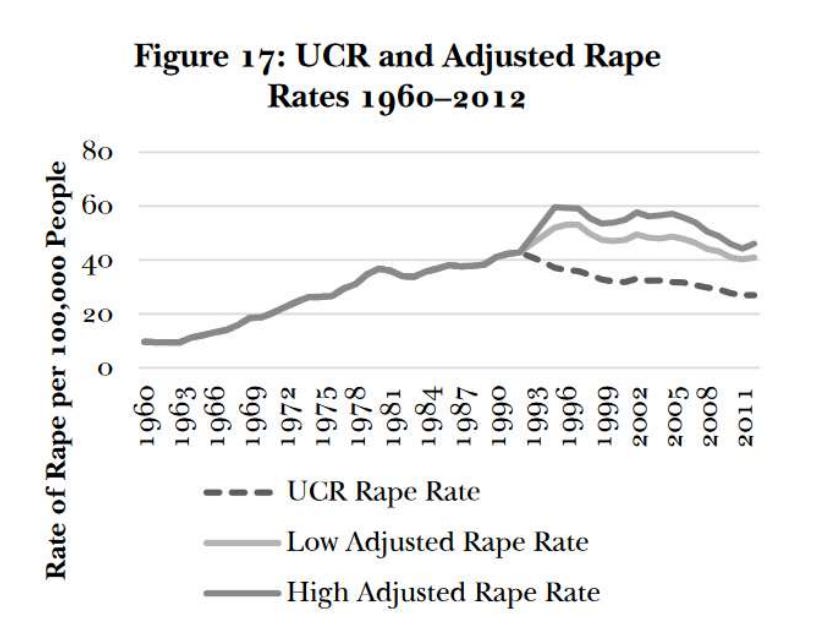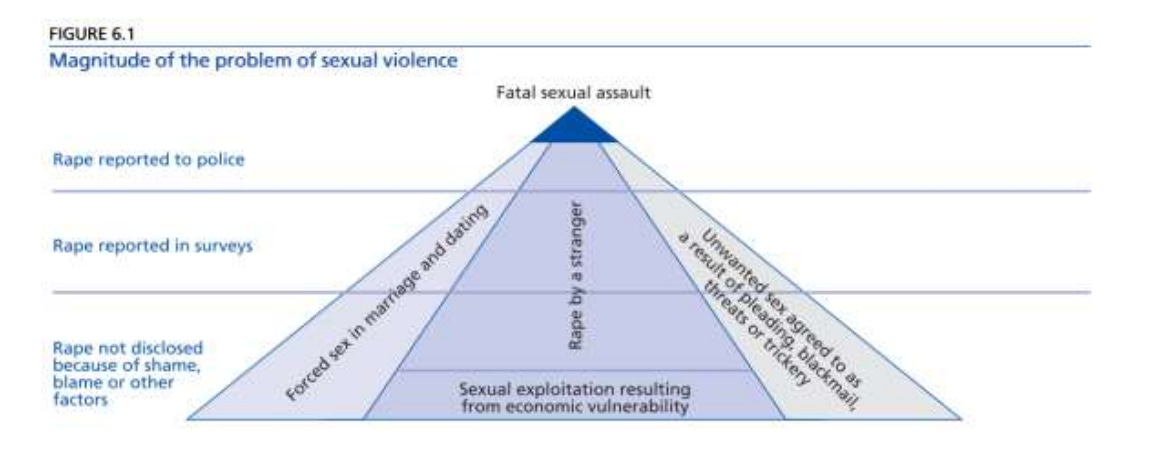Rape has increased since the liberalisation of pornography laws
Busting the pernicious "Porn Up, Rape Down" myth
A precipitous increase in reported rapes
In the decades following the liberalisation of pornography laws, rape reports increased by 139% in the U.S., 94% in England, 160% in Australia, and 107% in New Zealand. In contrast, countries with strict obscenity laws saw a much smaller increase or even a decrease in rape reports.
“Porn Up, Rape Down” is a phrase coined by D’Amato (2006) in a paper frequently cited in discussions on pornography’s societal impact—presumably by researchers who haven’t bothered to read it. The paper suggests increased pornography consumption has led to a reduction in sexual violence. However, the paper, authored by someone demonstrating profound statistical illiteracy, implies a causal relationship without establishing the necessary, though not sufficient, correlation. That is, proof that one variable changes as a function of the other.
Most damningly: the theory is based on falsified data. After correcting for under-counting, the opposite trend is observed: rape rates in America have increased with the advent of easily accessible pornography. Any perceived decline is the product of approximately 22% of police departments nation-wide under-counting, at the very least, forcible vaginal rapes due to a mixture of hostile attitudes to rape victims and a desire to look successful in the fight against crime. As such, an investigation revealed reported rapes were being dismissed as ‘unfounded’ without investigation, reclassified as lesser offences, or simply not recorded.
Unlike murder, assault, burglary, theft, and automobile theft, rape has not decreased since the early 1990s, nor has it experienced a sudden increase since 2010 (Chart 1). On the contrary, there has been a precipitous increase in reported rape following the liberalisation of pornography laws in 1964 (Chart 2, refer the solid lines). (D’Amato, ever disingenuous, charts rape from 1973, giving the appearance of a plateau followed by a decline, while conveniently excluding the sharp rise in reported rape rates immediately following the liberalisation of pornography laws in 1964.)
Erroneous rape statistics
Corrected rape statistics

Now is, of course, the time to recall a sobering fact: the vast majority of rapes are not reported to police, as illustrated in the pyramid below. Self-report of sexual assault (including rape: 36%) more than doubled between 2017 and 2018 in the United States. At the same time, reporting to police decreased from 40% to 25%.
This section was in no way designed to address whether the proliferation of pornography has increased rape. Rather, it debunked the claim that pornography has led to a reduction in sexual violence—or, more broadly, that sexual violence has decreased at all.
Pornography use increases rape perpetration
Moulding minds
Among men, an increase in past pornography use predicted less egalitarian attitudes, and more hostile sexism toward women. The same study also found experimental exposure to non-violent pornography lead to hostile sexism among men and women low in agreeableness.
A laboratory study exposing men to almost 5 hours of non-violent pornography over the course of 6 weeks (at the time considered a “massive” amount) lead them to be desensitised to sexual violence. Men exposed to pornography espoused attitudes trivialising or justifying rape at significantly higher rates than the control group. (Much like finding a control group of young men naïve to pornography, presumably non-violent pornography was easier to come by in the 1980s.)
Whether violent or non-violent, pornography objectifies and dehumanises women to the point where men cannot empathise with them as human beings, viewing them only as tools for their sexual gratification. In this vein, a meta-analysis found a link between men’s pornography consumption—particularly of violent pornography, but also non-violent—and attitudes supportive of violence against women.
Shaping behaviours
A meta-analysis of 22 studies from 7 different countries found that pornography consumption is associated with sexual aggression, both verbal (e.g. pressuring for sex through argument or threat to end a relationship) and physical (use of force).
A recent longitudinal study of American youth found that after controlling for other influential factors, exposure to parental spousal abuse and current exposure to violent pornography—both acting as scripts for inter-personal violence—were the two strongest predictors of future sexual violence, including coercive sex and rape.
This is, of course, the tip of the iceberg, and the studies which show pornography use increases the risk of rape perpetration (and even victimisation) are legion.
Conclusion
Pornography, increasingly characterised by gendered violence and degradation, is an undeniable societal ill that predisposes some men to rape and intensifies the urges of those already inclined toward such behaviour. It does so with the powerful reinforcement of orgasm and the normalisation of non-simulated violence in its pervasive media presence. It would be a mistake to dismiss pornography as merely entertainment when its influence permeates relationships, shapes sexual expectations, undermines efforts toward gender equality, and increases the likelihood of rape perpetration and victimisation.
Knowledge is Power, France is Bacon is a reader-supported publication. If you would like to support KIPFIB, please consider a subscription or buying me a coffee.






My apologies - I blipped over the fact you weren't citing a single study. Too hasty a read while preparing to head out to the gym. Will be more careful next time!
A good debunking of badly-conceived academic research, but it begs one basic question: do men who (consciously or unconsciously) harbor pre-existing tendencies toward dehumanizing women tend to be those who watch a greater quantity of pornography? One study conducted nearly fifty years ago doesn't seem sufficient to answer this question. It would be excellent if properly-designed & controlled studies across many different nations could shed light on this important topic, especially as we're now in a world in which ultra-far-right Parties are gaining prominence everywhere, and they tend to be the most hostile to women's rights as human beings. Thanks for making more people aware of the issue!